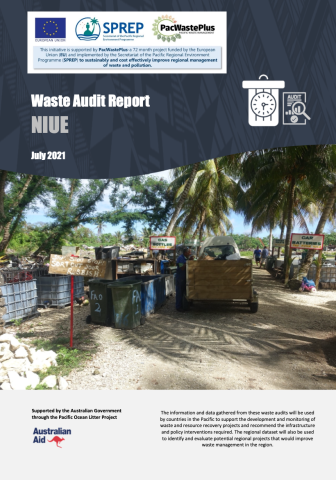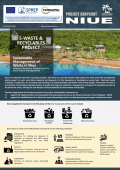
This report presents the findings of the waste audit undertaken for Niue. The results are part of a Pacific-wide audit programme being implemented by the Secretariat of the Pacific Regional Environment Programme (SPREP) and other agencies.
The audit focused on a number of types of waste, including:
E-waste
E-waste across the island is collected periodically through a government scheme and two stockpiled. However, due to limited storage space, collections of e-waste have been postponed since 2020 to reduce double handling, because of the lack of machinery to assist with the collection and the delayed opening of the new recycling facility.
End-of-life vehicles
The disposal and recovery of end-of-life vehicles are currently managed by an external agency with the cost directly covered by the customer. The fee associated with the recovery and disposal is often high due to the hired machinery required to uplift the vehicle and transport across the island, double handling of end-of-life vehicles, and limited space for storage. As a result, there is a large volume of end-of-life vehicles stockpiled across the island.
Used oil
The main producers of waste oil in Niue include the Niue Power Corporation (NPC), the Public Works Department and private garages and the community. Collection and storage of waste oil was taken over by the Bulk Fuels Agency and is stored within their compound located in Alofi. The used oil is stored in a tank container which takes between 6-9 months to fill. Previously waste oil was exported to New Zealand.
Persistent organic chemicals (POPs)
The shipping container storing chemicals at the Huihui site drums has been deteriorating since 2005 and the drums are required to be transferred to a more secure container. The drums containing pesticides and insecticides also appear to have leaked into the container, resulting an illegal dumping of paint and chemicals at the Huihui site next to the e-waste.
The information and data gathered from the waste audits will be used by countries in the Pacific to support the development and monitoring of waste and resource recovery projects and recommend the infrastructure and policy interventions required. The regional dataset will also be used to identify and evaluate potential regional projects that would improve waste management in the region.
For more information, please contact: sprep [at] sprep.org (sprep[at]sprep[dot]org)




